2022 Jessamy Stursberg Youth Poetry Prize Winners
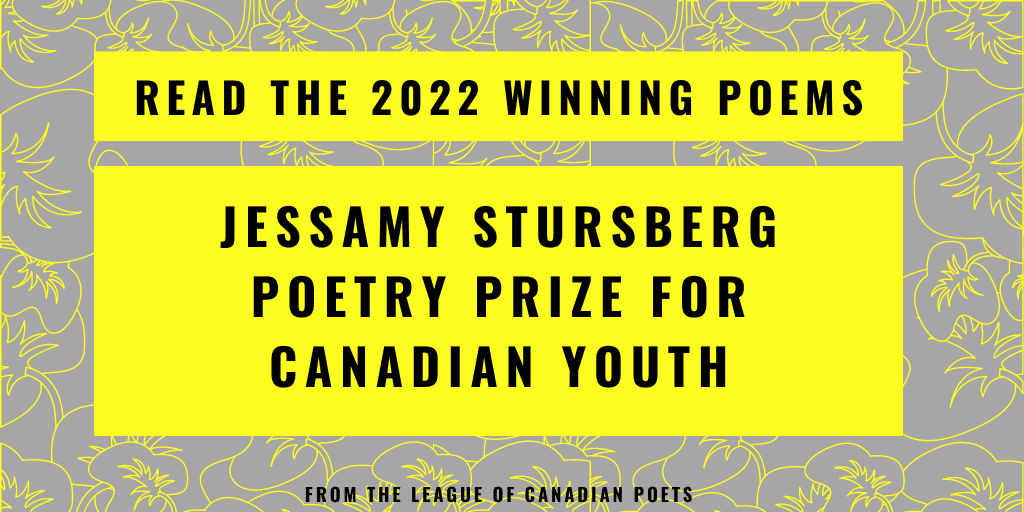
Congratulations to the 2022 Winners of the Jessamy Stursberg Poetry Prize. The jurors were incredibly impressed with the quality of poems submitted this year, and we thank everyone who shared their poetry with us— we know the future of professional poetry in Canada is in good hands!
The Jessamy Stursberg Poetry Prize for Canadian Youth was established to foster a lifelong relationship between Canadian youth and the literary arts, specifically poetry. The prize is supported through a generous donation from the Stursberg family and other donors in honour of Jessamy Stursberg. The prize accepts submissions from young poets all across Canada, with three prizes awarded in both the Junior (grades 7 to 9) and Senior (grades 10 to 12) categories:
Winner: $400
Second Place: $350
Third Place: $300
Senior winners
Jury: Michael Lithgow, Kathryn Gwun-Yeen Lennon, Winston Le
First place, senior: birdbrained by Briana Lu
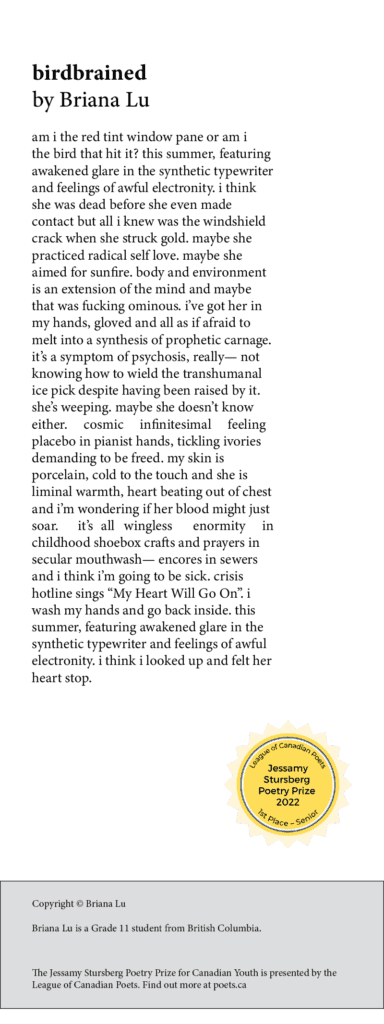
From our jurors: “birdbrained” is an urgent and confident poem emerging from a crisis in subjectivity on the part of the narrator — a somewhat breathless momentum created linguistically around the singular arresting image of an encounter with an injured bird. There is an epistemically unsettled blurring of boundary between bird and poet as the language (and poem!) tumble headlong to startling conclusion. The poet’s inventive and energetic language push at the confines of rationality, not only reinforcing a sense of crisis in the poem, but building tension towards the outcome of the narrator’s failed attempt to save the bird and the bird’s/narrator’s stopped heart.
Second place, senior: 99% by Grace Hu
From our jurors: In 99% the narrator is wrestling with the limitations of a certain kind of knowing – academic learning – and how it can both deform human subjectivity and overlook and leave out critical kinds of wisdom and experience, especially the knowledge of how to navigate the difficulties of love. The metaphoric language and images work well to create poetic tensions reinforcing the somewhat dire outcome of the narrator’s humanity being partially or perhaps even wholly erased.
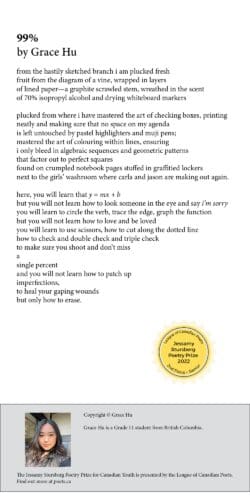
Third place, senior: Colors in a new world by Maggie Yang
From our jurors: Colors in a new world is a loving homage to an elderly relative in the context of geographic and cultural dislocation and the complexities of migration, race, and belonging. The poet does an excellent job of balancing the specificity of moments in time within wider geopolitical tensions, all of it culminating in a palpable sense of loss.
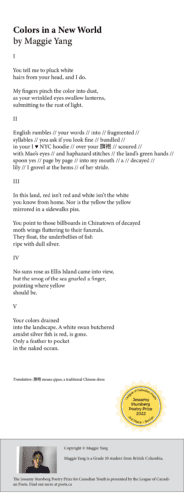
Junior Winners
Jury: Mikko Harvey, Amy LeBlanc
First place, junior: Asian Girl by Kyo Lee
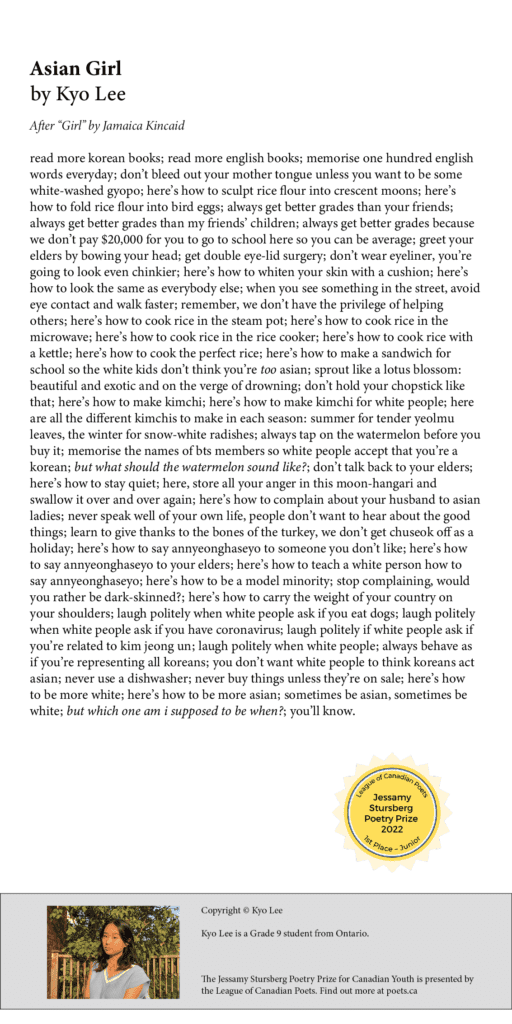
From our urors: The tone in Kyo Lee’s “Asian Girl” is so memorable— the author utilizes the most striking parts of “Girl” by Jamaica Kincaid and puts a unique spin on the voice and narrative. Lee uses exceptionally descriptive language to express how the speaker feels pulled in different directions with the pressure to fit in. Lee has taken a great piece of literature and put their own mark on it.
Second place, junior: The Land Bridge Theory by Angel Zhao
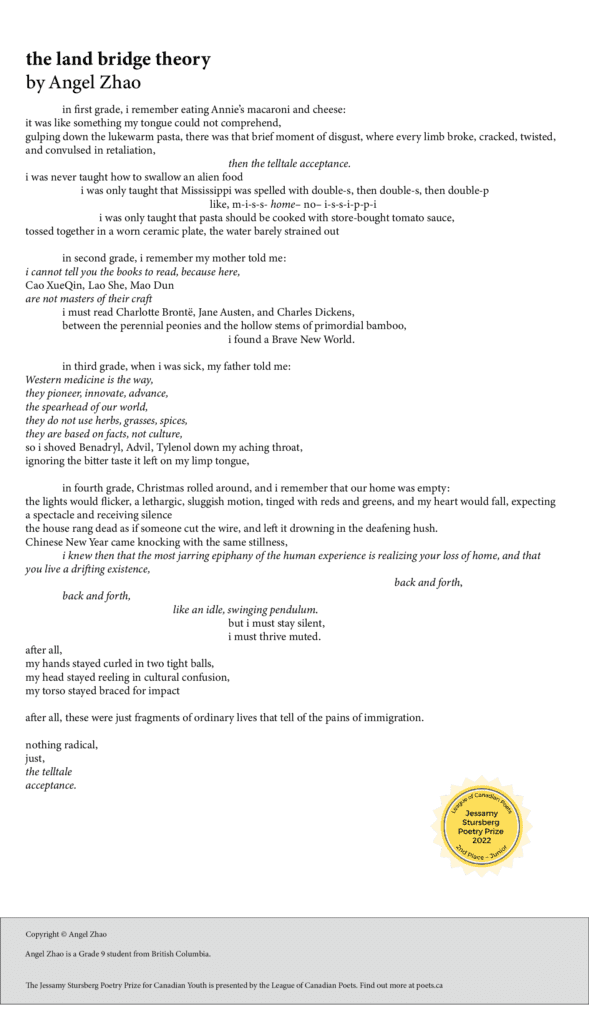
From our jurors: Angel Zhao’s “The Land Bridge Theory” is so densely packed with memories that the reader feels immediately invited in. Zhao uses sensory details like taste and touch to help us understand “the telltale acceptance” that the speaker faces as they work with and against cultural pressures. This is a poem that readers will remember.
Angel Zhao is a Chinese Canadian poet whose work has also been featured in the ISABC’s Ariadne anthology, Pluvia literary magazine’s website, and BASA’s Firecracker anthology. Additionally, her short film Teenage Homage was a runner up in The New York Times’ 2021 Coming of Age multimedia contest.
Third place, junior : Liquid Gold by Sofia Varma-Vitug
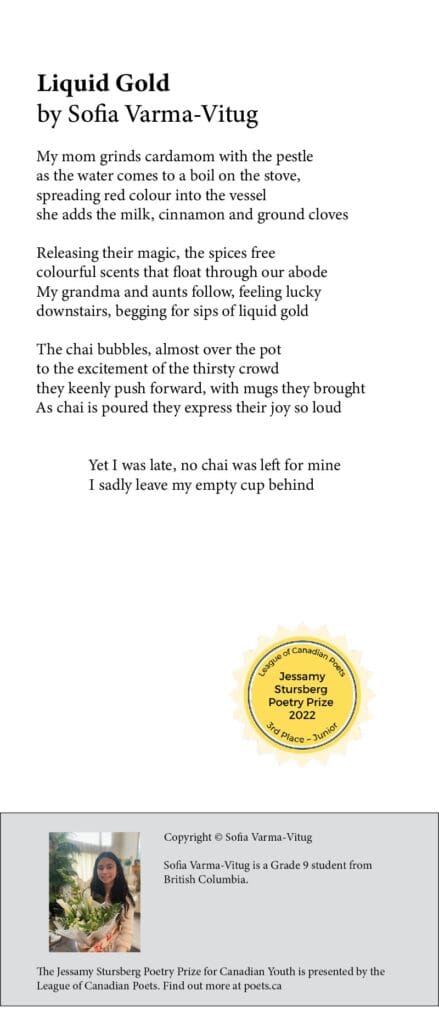
In Sofia Varma’s “Liquid Gold” we are introduced to a kitchen filled with scents and spices— the allure of this poem resides in the familiar smells of cardamom, cinnamon, and clove. This is a poem about family and tradition in the form of a sonnet that lulls us with its rhythmic tones and its rhymes.
Honourable mentions
Senior:
“Mari’s apartment” by Eryn McNamara
“If You Talk to My Corpse, Bury It Well” by Gurleena Sukhija
“Before we gave it some English” by Samuel Nnadi
“Immigrant Tribes” by Avery E. Kats
“Neither” by Ria Baxi
“A finite infinity” by Angela Cen
“Fragrant Harbour” by Sarah Ng
Junior:
“Greenhouse Gasses” by Catie Musselman
“Plums” by Alison Wang
“Out of Breath” by Sana Huang
“Everard” by Jasmine Hume: for its unique elliptical response to a tragic contemporary event
“Sub Rosa” by MiaoHan Wang: for its crisp and enigmatic delivery
“Seasons”by Sophia Zhang: for its linguistic and imagistic richness
“Looking Beautiful” by Sukrutha Jambur Sachin: for its compelling metaphysical sensibility
